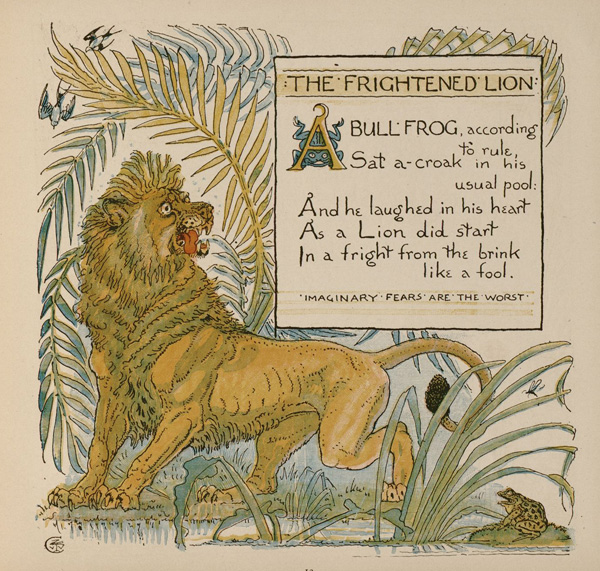The Lion and the Frog
A lion came to a watering hole in the forest, drank his fill, and fell asleep in the nearby grass. All of a sudden, a loud sound awakened him. "What's that?" he snarled. The sound got louder, and louder, and LOUDER. "Some dangerous creature is coming this way!" he thought, imagining the worst, and he began to creep slowly backwards, tail between his legs. But then, he saw the source of the sound: it was a frog who had hopped out of the water and was now sitting on the ground, croaking loudly. Furious, the lion crushed the frog beneath his paw. "My ears had me fooled," he sighed, "until I saw with my eyes."
In the endomythium, I played with the contrast between ears/eyes. Another way to do that would be to play on a contrast between imagination and reality, but since this fable was about sound, I went with ears/eyes.
I chose this fable today because I was reading Desbillons' Latin version yesterday and was very surprised to find an epimythium that blamed the frog for what had happened, with the moral of the story being that it is dangerous to arouse false fears in someone who is strong-spirited. Clarke's version also rebukes the frog, reading the fable as a criticism of loud-mouthed people: The lion, when he heard the frog talking at a great rate, thinking it to be some great beast, turned himself back, and, standing a little, he sees the frog going out of the pool; which presently, enraged, he trod under with his feet, saying, "Thou shalt not move any more any animal with thy noise, that he may look at thee." Moral. The fable signifies that among noisy men, nothing is found except a tongue.
So, it is definitely possible to read the fable in two ways: the lion rebuking himself for his foolishness, or rebuking the frog for his loudness. Dugard's version makes a nice connection between this fable and the fable of the mountains who gave birth to a mouse. In that fable, nobody blames the mountains for being loud; instead, the focus of that fable is all on the foolishness of the people, and that is how I prefer to read the fable of the frog and the lion too. I think if I wanted to tell this fable as a rebuke of the frog, I would have the frog actually say something, maybe boasting about himself or speaking some other kind of foolish nonsense, instead of just croaking.
What leads people, I suppose, to reading the fable as a rebuke against the noisy frog is the fact that the frog does get squashed. In L'Estrange's version, however, he is explicit that the lion kills the frog because of his own frustration and embarrassment at having been fooled: A Lyon that was Ranging about for his Prey, made a Stop all on a Sudden at a Hideous Yelling Noise he heard, which not a little Startled him. The Surprize put him at first into a Shaking Fit; but as he was looking about, and Preparing for the Encounter of some Terrible Monster, what should he see but a Pityful Frog come Crawling out from the Side of a Pond. And is This All? (says the Lyon) and so betwixt Shame and Indignation he put forth his Paw, and Pash'd out the Guts on't. The MORAL. There's no Resisting of First Motions; but upon Second Thoughts we come Immediately to our selves again.
In the limerick version by Linton, illustrated by Walter Crane, the focus is completely on the lion as fool. He does not even crush the frog; he's just scared!

Click here for more illustrations and English versions of this fable, and for more "favorite fables" at this blog, see the Aesopica label. You can find out more about this retelling project, see this post: Favorite Aesop's Fables.
A Bull-Frog, according to rule,
Sat a-croak in his usual pool:
And he laughed in his heart
As a Lion did start,
In a fright from the brink like a fool.
IMAGINARY FEARS ARE THE WORST

Click here for more illustrations and English versions of this fable, and for more "favorite fables" at this blog, see the Aesopica label. You can find out more about this retelling project, see this post: Favorite Aesop's Fables.
No comments:
Post a Comment
Comments are limited to Google accounts. You can also email me at laurakgibbs@gmail.com or find me at Twitter, @OnlineCrsLady.